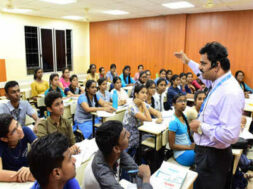
NEW DELHI, Jan 18: The union ministry of education on Thursday issued new guidelines on the functioning of the Coaching Centres disallowing them permission to enrol students below the age of 16 and admission procedure will be permitted only after successful completion of the secondary school examination.
The new guidelines also advise the coaching institutes against making misleading promises and guaranteeing rank or good marks. The guidelines for regulating coaching institutes have been framed to address the need for a legal framework and manage the unregulated growth of private coaching centres.
It comes after complaints received by the government about rising cases of student suicides, fire incidents, lack of facilities in coaching centres as well as methodologies of teaching adopted by them. For registration of the coaching centres, the new guidelines said: No coaching centre will engage tutors with qualifications lower than graduation, Make misleading promises or guarantees of ranks or good marks to parents/students for enrolling them in the coaching centre, Enroll students below 16 years of age; student enrollment should only occur after the secondary school examination, Publish or be involved in the publication of any misleading advertisement related to claims, directly or indirectly, regarding the quality of coaching, facilities offered, or the results obtained by the coaching centre or its students, and be registered if it has less than the minimum space requirement per student.
It said the objectives for the guidelines include: Establishing a framework for the registration and regulation of coaching centres, Defining minimum standard requirements for the operation of coaching centres, Safeguarding the interests of students enrolled in coaching centres, Encouraging coaching centres to prioritise co-curricular activities for comprehensive student development and Providing career guidance and psychological counselling to ensure the mental well-being of students.
The registration process for coaching centres involves submitting applications, undergoing renewal procedures, and complying with specified conditions. Registration conditions include hiring qualified tutors, avoiding deceptive promises, admitting students above the age of 16, and implementing a counselling system.
The guidelines also address fee-related matters, emphasising fair and reasonable charges, transparent fee receipts, and detailed prospectuses. Refund policies are outlined, and fee adjustments are specified for students leaving a course prematurely.
Infrastructure requirements mandate a minimum space allocation per student, adherence to safety codes, provision of first aid and medical facilities, electrification, ventilation, lighting, clean drinking water, and security measures.
Regarding class-related aspects, the guidelines stress timely completion of classes, avoiding conflicts with regular school hours, offering support classes, ensuring breaks to reduce pressure, weekly offs, and limiting daily coaching hours. Co-curricular activities are encouraged, and counselling sessions on life skills and various topics are recommended.
Overall, the guidelines aim to establish a regulatory framework that ensures the well-being and proper education of students attending coaching centres.
The certificate of registration granted to a coaching centre may be cancelled at any time if the competent authority is satisfied that the centre has violated any of the guidelines’ provisions or terms and conditions of registration. However, the competent authority must provide the certificate holder with a reasonable opportunity to present their case before making such a decision.
The government has initiated measures in alignment with the National Education Policy (NEP) 2020, addressing the Common University Entrance Test (CUET), conducting entrance examinations in 13 regional languages, expanding the number of seats in Higher Education Institutions (HEIs), and establishing high-quality Higher Education Institutions.
To assist students in preparing for NEET (UG) and JEE (Main) entrance examinations, the National Testing Agency (NTA) has launched the ‘National Test Abhyas’ Mobile App, providing candidates with access to high-quality mock tests online free of charge.
(Manas Dasgupta)













